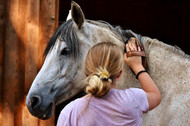Horse Care 101
Jun 3rd 2021
 If wishes were horses, we'd all ride free, but owning a horse is a different matter. Horses are large breed animals that require a significant amount of attention, not to mention space. If you're planning to buy one or more, you need a clear and accurate understanding of just what goes into caring for such an animal.
If wishes were horses, we'd all ride free, but owning a horse is a different matter. Horses are large breed animals that require a significant amount of attention, not to mention space. If you're planning to buy one or more, you need a clear and accurate understanding of just what goes into caring for such an animal.
Whether you're interested in owning a horse as a pet, you need one to ride on your ranch, or you're seeking a horse for show and competition, proper care is essential for both practical and ethical reasons. Here are just a few basics to give you an idea of your responsibilities when you own a horse.
Feed and Water
Proper feed is an essential component of maintaining a healthy animal, and horses should consume roughly 2-4% of their body weight in grass, hay, or other types of feed daily. Horses rely on a high-fiber diet for proper digestion, so quality hay should make up the bulk of their diet.
Make sure to keep hay fresh and free of mold or dust that could harm your animal, and steer clear of high-carb grains that could impact your horse's overall health. Abundant clean drinking water should always be available. In hot weather conditions, a horse may drink up to 25-45 liters of water daily.
Shelter and Exercise Space
Just as you walk a dog each day, your horse needs daily exercise to remain healthy and well. This will help to ensure proper circulation, prevent their legs from swelling and causing pain and mobility issues, and improve digestion.
Horses typically require 15-20 minutes of exercise daily, at a bare minimum, and in order to keep your horse fit, up to two hours of daily exercise is recommended. Exercise could include walking (leading), riding, lunging, and so on.
If you don't have time for this level of care, you at least need to provide adequate roaming space for your horse to walk and run daily. Horses that aren't properly exercised could get bored and begin to act out. They may also start to put on weight.
It's important to ensure that you exercise your horse based on its age and fitness level so as to avoid injury. Make sure that the amount of feed you're giving is appropriate for the level of daily exercise your horse receives.
Appropriate shelter is also important, and depending upon your climate, this could include covered stalls, box stalls, and/or a temperature-controlled environment for extreme heat or cold weather conditions.
Grooming and Medical Care
Because of their diet, regular deworming is a common occurrence in horse ownership, as are regular vaccinations, as recommended by your veterinarian. Finding a licensed large animal veterinarian in your area is important. Horses should be groomed and examined regularly, ideally on a daily basis, to catch any potential health concerns early, and you should always groom your animal before and after riding.
Companionship
Socialization is an important consideration with any animal. Horses, in particular, are herd animals, which means they prefer the company of other horses. A horse that isn't properly socialized can start to display behavioral problems when they're alone, during riding, or in other interactions with humans.
In Conclusion
When you know how to properly care for your horse, providing needed food, water, shelter, exercise, grooming, medical care, and companionship, you'll have a health and happy animal that enriches your life for years to come.

